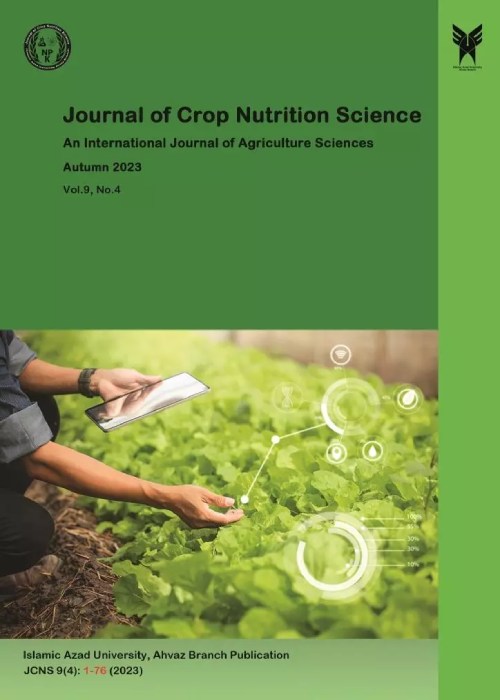Evaluation Effect of Salinity Stress and Potassium Sulfate on Seed yield, its Components and Qualitative Traits of Mung Bean (Vigna radiate L.)
Author(s):
Article Type:
Research/Original Article (بدون رتبه معتبر)
Abstract:
BACKGROUND
Among the abiotic stresses, soil salinity is a prevalent environmental issue that impacts more than 77 million hectares (5% of the cultivable land worldwide). Potassium plays a crucial role in plant growth under saline conditions, as it is involved in essential processes such as photosynthesis and osmo regulatory adaptations that help plants cope with water stress.OBJECTIVES
To investigate the impact of salinity stress and potassium sulfate on crop production and qualitative traits of mung bean current research was done.METHODS
This study was conducted according factorial experiment based on randomized completely block design with three replications. The study was carried out in pots located in Ahvaz during the 2014 cropping season. The investigated factors included potassium fertilizer at three levels (including 0, 100, 200 kg.ha-1) from source of potassium sulfate and salinity stress from sodium chloride at 4 levels (including control, 2, 4, 6 ds.m-1).RESULT
The results indicated that both salinity stress treatment and potassium fertilizer had a significant impact on yield and yield components, biological yield, chlorophyll index and proline content. The highest seed yield (with an average of 15.4 grams per plant) was achieved in the 0 ds.m-1 (control), while the lowest yield (with an average of 9.8 grams per plant) was observed at the salinity level of 6 ds.m-1. The treatment with 6 ds.m-1 salinity level exhibited the highest proline content (with an average of 7.76 mg.g-1 of leaf weight). Additionally, the application of potassium fertilizer led to a significant increase in both seed yield and biological yield. The highest seed yield was observed in the control treatment (without salinity stress) and with the consumption of 100 kg.ha-1 of potassium fertilizer (with an average of 15.29 grams per plant). On the other hand, the lowest seed yield was recorded in the treatment with 6 ds.m-1 salinity level and no application of potassium fertilizer (with an average of 6.86 grams per plant). According to the obtained results, under the salinity treatment of 4 ds.m-1, the application of 100 kg.ha-1 of potassium fertilizer effectively prevented the reduction in Mung bean yield, which was not significantly different from the 200 kg.ha-1 fertilizer treatment.CONCLUSION
The use of 100 kg.ha-1 of potassium fertilizer can be considered as an effective management strategy to mitigate the negative impact of salinity stress on mung bean yield.Keywords:
chloride , Chlorophyll , Proline , Pulse , sodium
Language:
English
Published:
Journal of Crop Nutrition Science, Volume:9 Issue: 2, Spring 2023
Pages:
1 to 13
magiran.com/p2629537
دانلود و مطالعه متن این مقاله با یکی از روشهای زیر امکان پذیر است:
اشتراک شخصی
با عضویت و پرداخت آنلاین حق اشتراک یکساله به مبلغ 1,390,000ريال میتوانید 70 عنوان مطلب دانلود کنید!
اشتراک سازمانی
به کتابخانه دانشگاه یا محل کار خود پیشنهاد کنید تا اشتراک سازمانی این پایگاه را برای دسترسی نامحدود همه کاربران به متن مطالب تهیه نمایند!
توجه!
- حق عضویت دریافتی صرف حمایت از نشریات عضو و نگهداری، تکمیل و توسعه مگیران میشود.
- پرداخت حق اشتراک و دانلود مقالات اجازه بازنشر آن در سایر رسانههای چاپی و دیجیتال را به کاربر نمیدهد.
In order to view content subscription is required
Personal subscription
Subscribe magiran.com for 70 € euros via PayPal and download 70 articles during a year.
Organization subscription
Please contact us to subscribe your university or library for unlimited access!


